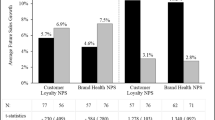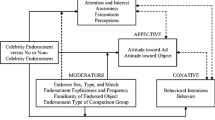Abstract
Can a local celebrity endorser event influence the endorsed global brand’s stock value? Employing cultural perspective, signal theory and attribution theory, we hypothesized that, in an emerging market such as China, the endorsed global brands could gain and brands endorsed by a low-blameworthy celebrity could gain more from a local celebrity endorser scandal event. Using event study method, our results suggest that the entire endorsed brand portfolio exhibits statistically significant gains on the global stock market shortly after the focal scandal event, and brand portfolio endorsed by low-blameworthiness celebrity accrued more gains than brand portfolio endorsed by high-blameworthiness celebrity. The discussion of managerial and policy implications is presented in the concluding section.

Similar content being viewed by others
References
Agnihotri, A., and S. Bhattacharya. 2016. The Market Value Of Celebrity Endorsement: Evidence from India Reveals Factors That Can Influence Stock-Market Returns. Journal of Advertising Research 57 (3): 1–9.
Agrawal, J., and W. Kamakura. 1995. The Economic Worth of Celebrity Endorsers: An Event Study Analysis. The Journal of Marketing 59 (3): 56–62.
Amos, C., G. Holmes, and D. Strutton. 2008. Exploring the Relationship between Celebrity Endorser Effects and Advertising Effectiveness: A Quantitative Synthesis of Effect Size. International Journal of Advertising 27 (2): 209–234.
Baker, M., and J. Wurgler. 2007. Investor Sentiment in the Stock Market. The Journal of Economic Perspectives 21 (2): 129–151.
Bartz, S., A. Molchanov, and P. Stork. 2013. When a Celebrity Endorser Is Disgraced: A Twenty-Five-Year Event Study. Marketing Letters 24 (2): 131–141.
Berger, D., and H. Turtle. 2012. Cross-Sectional Performance and Investor Sentiment in a Multiple Risk Factor Model. Journal of Banking & Finance 36 (4): 1107–1121.
Biswas, S., M. Hussain, and K. O’Donnell. 2009. Celebrity Endorsements in Advertisements and Consumer Perceptions: A Cross-Cultural Study. Journal of Global Marketing 22 (2): 121–137.
Brown, S., and J. Warner. 1985. Using Daily Stock Returns: The Case of Event Studies. Journal of Financial Economics 14 (1): 3–31.
Byrne, A., M. Whitehead, and S. Breen. 2003. The Naked Truth of Celebrity Endorsement. British Food Journal 105 (4/5): 288–296.
Campbell, J., A. Lo, and A. MacKinlay. 1997. Event-Study Analysis. The Econometrics of Financial Markets, 149–180. Princeton: Princeton University Press.
Carrillat, F.A., A. d’Astous, and H. Christianis. 2014. Guilty by Association: The Perils of Celebrity Endorsement for Endorsed Brands and Their Direct Competitors. Psychology & Marketing 31 (11): 1024–1039.
Carrillat, F.A., and A. d’Astous. 2014. Power Imbalance Issues in Athlete Sponsorship Versus Endorsement in the Context of a Scandal. European Journal of Marketing 48 (5/6): 1070–1091.
Chang, S. 2011. Sex, Rice, and Videotape: Popular Media, Transnational Asian/American Masculinity, and a Crisis of Privacy Law in the Edison Chen Sex Scandal. Amerasia Journal 37 (2): 28–56.
Chiu, L. 1972. A Cross-Cultural Comparison of Cognitive Styles in Chinese and American Children. International Journal of Psychology 7 (4): 235–242.
Choi, S., W. Lee, and H. Kim. 2005. Lessons from the Rich and Famous: A Cross-Cultural Comparison of Celebrity Endorsement in Advertising. Journal of Advertising 34 (2): 85–98.
Chung, S., C. Hung, and C. Yeh. 2012. When Does Investor Sentiment Predict Stock Returns? Journal of Empirical Finance 19 (2): 217–240.
Clark, J., T. Cornwell, and S. Pruitt. 2002. Corporate Stadium Sponsorships, Signalling Theory, Agency Conflicts and Shareholder Wealth. Journal of Advertising Research 42 (6): 16–32.
Ding, H., A. Molchanov, and P. Stork. 2011. The Value of Celebrity Endorsements: A Stock Market Perspective. Marketing Letters 22 (2): 147–163.
Ding, X., M. Ma, H. Wang, and others. 2004. The Effect of Morality Reputation on Evaluations of Celebrity Endorser and Endorsement: A Study of Chinese Consumer. http://www.irgrid.ac.cn/handle/1471x/258616.
Dowling, G. 2006. How Good Corporate Reputations Create Corporate Value. Corporate Reputation Review 9 (2): 134–143.
Elberse, A., and J. Verleun. 2012. The Economic Value of Celebrity Endorsements. Journal of Advertising Research 52 (2): 149–165.
Farrell, K., G. Karels, K. Montfort, and C. McClatchey. 2000. Celebrity Performance and Endorsement Value: The Case of Tiger Woods. Managerial Finance 26 (7): 1–15.
Festinger, L. 1957. Cognitive Dissonance Theory. Stanford: Stanford University Press.
Fiske, S. 1980. Attention and Weight in Person Perception: The Impact of Negative and Extreme Behavior. Journal of Personality and Social Psychology 38 (6): 889–906.
Fizel, J., C. McNeil, and T. Smaby. 2008. Athlete Endorsement Contracts: The Impact of Conventional Stars. International Advances in Economic Research 14 (2): 247–256.
Fong, C., and R. Wyer. 2012. Consumers’ Reactions to a Celebrity Endorser Scandal. Psychology & Marketing 29 (11): 885–896.
Garcia, D. 2013. Sentiment During Recessions. The Journal of Finance 68 (3): 1267–1300.
Gilbert, D., and P. Malone. 1995. The Correspondence Bias. Psychological Bulletin 117 (1): 21–38.
Jiang, J., Y.H. Huang, F. Wu, H.Y. Choy, and D. Lin. 2015. At the Crossroads of Inclusion and Distance: Organizational Crisis Communication during Celebrity-Endorsement Crises in China. Public Relations Review 41 (1): 50–63.
Keel, A., and R. Nataraajan. 2012. Celebrity Endorsements and Beyond: New Avenues for Celebrity Branding. Psychology & Marketing 29 (9): 690–703.
Keller, K. 1987. Memory Factors in Advertising: The Effect of Advertising Retrieval Cues on Brand Evaluations. Journal of Consumer Research 14 (3): 316–333.
Klein, J. 1996. Negativity in Impressions of Presidential Candidates Revisited: The 1992 Election. Personality and Social Psychology Bulletin 22 (3): 288–295.
Kelley, H.H. 1967. Attribution Theory in Social Psychology. In Nebraska Symposium on Motivation. University of Nebraska Press.
Knittel, C., and V. Stango. 2014. Celebrity Endorsements, Firm Value, and Reputation Risk: Evidence from the Tiger Woods Scandal. Management Science 60 (1): 21–37.
Kroloff, G. 1988. At Home and Abroad: Weighing in. Public Relations Journal 44 (8): 8–10.
Hsu, C.K., and D. McDonald. 2002. An Examination on Multiple Celebrity Endorsers in Advertising. Journal of Product & Brand Management 11 (1): 19–29.
Lehman, D., C. Chiu, and M. Schaller. 2004. Psychology and Culture. Annual Review of Psychology 55: 689–714.
Lerner, M., and D. Miller. 1978. Just World Research and the Attribution Process: Looking Back and Ahead. Psychological Bulletin 85 (5): 1030.
Lintner, J. 1965. The Valuation of Risk Assets and the Selection of Risky Investments in Stock Portfolios and Capital Budgets. The Review of Economics and Statistics 47 (1): 13–37.
Louie, T., R. Kulik, and R. Jacobson. 2001. When Bad Things Happen to the Endorsers of Good Products. Marketing Letters 12 (1): 13–23.
Louie, T., and C. Obermiller. 2002. Consumer Response to a Firm’s Endorser (Dis) Association Decisions. Journal of Advertising 31 (4): 41–52.
Lowe, C., and F. Medway. 1976. Effects of Valence, Severity, Arid Relevance on Responsibility and Dispositional Attribution. Journal of Personality 44 (3): 518–538.
Mathur, L., I. Mathur, and N. Rangan. 1997. The Wealth Effects Associated with a Celebrity Endorser: The Michael Jordan Phenomenon. Journal of Advertising Research 37 (3): 67–74.
Mazzocco, P., M. Alicke, and T. Davis. 2004. On the Robustness of Outcome Bias: No Constraint by Prior Culpability. Basic and Applied Social Psychology 26 (2–3): 131–146.
Money, R., T. Shimp, and T. Sakano. 2006. Celebrity Endorsements in Japan and the United States: Is Negative Information All That Harmful? Journal of Advertising Research 46 (1): 113–123.
Petty, R., and Cacioppo, J. (1986). The Elaboration Likelihood Model of Persuasion.” In Communication and Persuasion, 1–24. Berlin: Springer.
Robertson, R. 1997. Comments on the “global Triad” and “glocalization”. Tokyo: Kokugakuin University.
Salinger, M. 1992. Standard Errors in Event Studies. Journal of Financial and Quantitative Analysis 27 (1): 39–53.
Sharpe, W. 1964. Capital Asset Prices: A Theory of Market Equilibrium under Conditions of Risk. The Journal of Finance 19 (3): 425–442.
Silvera, D., and B. Austad. 2004. Factors Predicting the Effectiveness of Celebrity Endorsement Advertisements. European Journal of Marketing 38 (11/12): 1509–1526.
Skowronski, J., and D. Carlston. 1989. Negativity and Extremity Biases in Impression Formation: A Review of Explanations. Psychological Bulletin 105 (1): 131–142.
Spence, M. 1974. Competitive and Optimal Responses to Signals: An Analysis of Efficiency and Distribution. Journal of Economic Theory 7 (3): 296–332.
Steenkamp, J., R. Batra, and D. Alden. 2003. How Perceived Brand Globalness Creates Brand Value. Journal of International Business Studies 34 (1): 53–65.
Tantiseneepong, N., M. Gorton, and J. White. 2012. Evaluating Responses to Celebrity Endorsements Using Projective Techniques. Qualitative Market Research: An International Journal 15 (1): 57–69.
Till, B., and T. Shimp. 1998. Endorsers in Advertising: The Case of Negative Celebrity Information. Journal of advertising 27 (1): 67–82.
Um, N. 2013. Celebrity Scandal Fallout: How Attribution Style Can Protect the Sponsor. Psychology & Marketing 30 (6): 529–541.
Um, N.H., and S. Kim. 2016. Determinants for Effects of Celebrity Negative Information: When to Terminate a Relationship with a Celebrity Endorser in Trouble? Psychology & Marketing 33 (10): 864–874.
Sun, Z. 2013. Cultural Values Conveyed Through Celebrity Endorsers: A Content Analysis of Chinese Television Commercials. International Journal of Communication 7: 2631–2652.
Yermack, D. 2011. The Michelle Markup: The First Lady’s Impact on Stock Prices of Fashion Companies. https://papers.ssrn.com/sol3/papers.cfm?abstract_id=1596803.
Zhou, L., and P. Whitla. 2013. How Negative Celebrity Publicity Influences Consumer Attitudes: The Mediating Role of Moral Reputation. Journal of Business Research 66 (8): 1013–1020.
Author information
Authors and Affiliations
Corresponding author
Rights and permissions
About this article
Cite this article
Zhang, J., Huang, L. Loss or gain? The impact of Chinese local celebrity endorser scandal on the global market value of the endorsed brands. J Market Anal 6, 27–39 (2018). https://doi.org/10.1057/s41270-018-0028-8
Revised:
Published:
Issue Date:
DOI: https://doi.org/10.1057/s41270-018-0028-8




